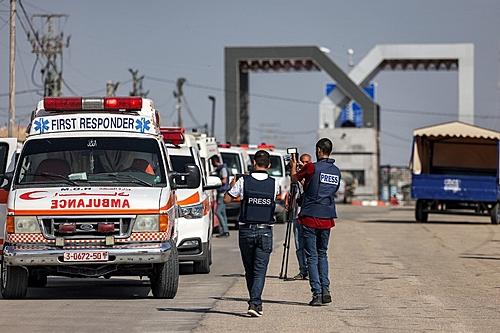
While Israel continues to bomb the Jabalia refugee camp, in the north of the Gaza Strip, in the latest aggression of its counteroffensive that has already entered its fourth week, the border with Egypt, to the south, has finally been opened so that people can begin to leave the conflict zone.
According to Egyptian security sources, a first group of injured Palestinians crossed the border this Wednesday (1), in ambulances, through the city of Rafah. A Qatar-brokered agreement between Egypt, Israel and Hamas states that a certain number of foreigners and seriously injured people will be allowed to leave Gaza.
The 32 Brazilians who live in the West Bank and asked to be repatriated headed to Brazil this Wednesday (1). The group, containing people from 11 cities in the Palestinian territory, was gathered in Jericho and from there went to Amman, capital of Jordan, where they were boarded on a Presidency of the Republic aircraft bound for the Brasília Air Base. Arrival will be around 5:30 am (local time) this Thursday (2). The number of passengers brought back to Brazil from the conflict zone thus reached 1,446, of which 1,443 were Brazilians and three were Bolivian.
Israel’s key ally, Jordan recalls ambassador due to attacks; Chile, Colombia and Bolivia do the same
According to Itamaraty, around 450 foreigners are already authorized to leave. They are citizens of Australia, Austria, Bulgaria, Finland, Indonesia, Jordan, Japan, the Czech Republic, professionals from the Red Cross and NGOs.
The group of 34 Brazilians who requested repatriation are still awaiting authorization to cross the border with Egypt, the only viable way for them to board a Brazilian Air Force plane and leave for Brazil.
“New lists will be published soon and our Brazilians must be on them”, said ambassador Alessandro Candeas, from the Brazilian representation in Ramallah, in the West Bank, another Palestinian territory neighboring Israel.
New attack on Jabalia
One day after Israel attacked the Jabalia refugee camp, in northern Gaza, the site was targeted again this Wednesday. There is no independent confirmation about the attack or concrete information about victims, perhaps due to the fact that the Gaza Strip is experiencing a new telephone and internet blackout due to attacks on local operators’ networks, but images show columns of smoke in the region.
The TV bureau chief Al Jazeera in Gaza, Wael Dahdouh, claims that several buildings were destroyed. Photographs taken on Tuesday show large craters in the ground next to the buildings. According to the Israel Defense Forces, the objective is to reach Hamas’ underground infrastructure.
Tuesday’s attack left 50 people dead and 150 injured, according to the Gaza Ministry of Health. Israel says that, among the fatal victims, there are a “large number of terrorists” from an important Hamas cell. The Palestinian group, in turn, claims that the dead were “martyrs”, and that among them are at least seven of the hostages kidnapped during their invasion of Israel on October 7th.
It felt like an “earthquake”, reported Ragheb Aqal, who lives there. “I went there and saw the destruction.” According to him, there were burned houses under rubble, many injured “martyrs” and pieces of bodies scattered around. Footage and photos show hundreds of people searching for victims in the rubble. “We are filling bags with children,” said a man, crying, as he held a small, bloody piece of white clothing.
“Children arrived at the hospital with deep wounds and severe burns. Many were screaming and asking for their parents,” said nurse Mohammed Hawajreh, from Al-Shifa hospital, according to the organization Doctors Without Borders.
AI accuses Israel of phosphorus attack
Amnesty International accuses Israel of using white phosphorus ammunition in civilian areas in southern Lebanon between October 10th and 16th. The human rights organization, based on videos, photos and interviews, states that one of the attacks, in the city of Dhayra, needs to be investigated as a war crime because it was an “indiscriminate attack” that injured at least nine civilians and damaged civil infrastructure.
This ammunition is not completely prohibited. It is usually used as an illuminator in confrontation areas and, by generating thick smoke, it helps to cover troop movements. But its use against civilians violates international law. Phosphorus burns the skin, can damage organs and suffocate.
*Article updated at 12:50 pm to correct the number of Brazilians who embarked from the West Bank
Editing: Leandro Melito

Source: www.brasildefato.com.br

